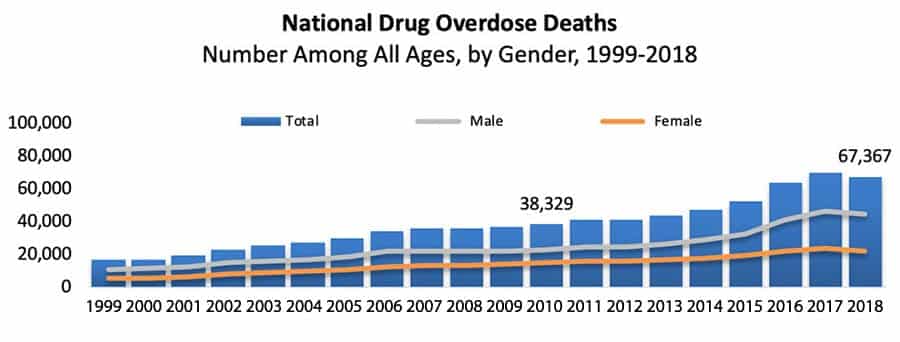If you are wondering whether you or a loved one may need rehab, you’ve come to the right place.
Drug and alcohol addiction has become a pervasive struggle in recent years. In the past two decades, the proliferating death to drug overdose rate has more than tripled. With growing accessibility to prescription drugs and the rise of other synthetic narcotics or opioids in underground markets (specifically fentanyl) drug abuse is more dangerous now than ever.

Although substance abuse dependencies have multiplied, so have the resources for addiction treatment. Hotel California has expanded our program to fit the needs of multiple types of people, such as those in high-demanding careers, addicts with trauma, and those suffering with co-occurring disorders.
With the rising rates of drug abuse, doctors and scholars answered the call to research more about treating drug and alcohol disorders. Under the Affordable Care Act in 2010, mental health and addiction rehab facilities became recognized by most major health insurance carriers.
(Check out which insurances we are in-network with, or accept, here.)

Source: Centers for Disease Control and Prevention, National Center for Health Statistics. Multiple Cause of Death 1999-2017 on CDC WONDER Online Database, released January, 2020
More attention and time have gone into the studying signs of addiction, severity, and various types of treatment available. Read more below to figure out some ways to determine whether it may be time to find treatment for yourself or your loved one.
Signs of A Substance Use Disorder (SUD)
Perhaps you’re wondering if a loved one is addicted to drugs. Although it’s sometimes difficult to tell, there are some obvious red flags to watch out for.
The National Institute on Alcohol Abuse and Alcoholism declares alcohol abuse a serious medical condition and diagnoses the disorder through a set of specific criteria and questions.
Whether it is a drug or alcohol addiction present, these questions could potentially indicate the need for treatment.
- Have you tried to quit drinking or stop using drugs, but found that you couldn’t seem to do so?
- Have you experienced withdrawal symptoms such as shaking, sweating, nausea, sleeplessness, anxiety, or depression when you try to stop using drugs?
- Do you drink or use drugs despite legal, social, financial, or health related consequences?
- Do you drink or use drugs to avoid withdrawal?
- Have you lost things or people you love because of drug or alcohol-related incidents?
- Have you attempted to limit the number of drinks/drugs or only drink/use at certain times?
Whether you answered yes to one or all of these questions, you may be able to benefit from some type of addiction treatment. If you or a family member might be suffering from an addiction, know there is help available.
With any questions about addiction treatment options, please call our admissions team by filling out our contact form.
Learn about our multiple levels of care available to clients.TREATMENT PROGRAMS
The Severity of Your Addiction
If you have determined whether you or a loved one does, indeed, show signs of a substance use disorder or physical dependence on drugs, it’s time to figure out how severe this drug abuse problem is.
Although no one (except a board-certified physician) can medically examine the severity of their addiction, our tips below may help determine whether it’s time to seek out a reputable treatment provider.
Someone’s addiction may be mild, moderate, or severe, depending on certain criteria. By assessing how far an addiction has progressed, healthcare professionals can tailor a treatment plan specifically for the patient’s needs.

The American Society of Addiction Medicine has formed criteria guidelines for treatment and management of substance use disorders. The ASAM criteria guidelines for addiction is the most widely used tool for doctors and psychologists in rehab facilities. The guidelines help a physician diagnose a substance use disorder, introduce necessary coping skills to the addict, and apply accountability measures in a restrictive setting to prevent relapse. Co-occurring mental health disorders are also taken into account during the diagnosis and treatment protocols for the patient’s overall growth.
The ASAM Criteria Dimensions Are As Follows:
1. Withdrawal potential
Withdrawal can appear after quitting, or cutting back on, your drug of choice. This is one of the most important steps to consider when assessing what level of care or type of treatment your or your loved one may need.
Withdrawal occurs when the body has become so physically dependent on a substance that when the body no longer receives it or receives less of it than normal, the body becomes violently ill.
If you or a family member would like to stop drinking or using, it is important to receive proper medical intervention and clinical supervision before quitting cold turkey.
Withdrawal can be a dangerous and even life-threatening process to endure alone. Specifically, if you are taking multiple drugs, mixing drugs with alcohol, or taking prescription drugs, the risks increase exponentially. Withdrawal considers the amount used each time, frequency of use, duration of use, and method of use. Depending on the substance, withdrawal symptoms may include:
- Tremors
- Sweating
- Nausea
- Vomiting
- Seizure
- Rapid heart rate
- Sleeplessness
- Anxiety
- Depression and more.
2. Biomedical Conditions
This dimension of considering how serious an addiction is addresses other medical conditions a patient may be facing alongside addiction. This is an important aspect to consider because it can affect the withdrawal process and put individuals at high risk if they don’t receive the proper treatment.

Often, people with a medical condition (such as anxiety) that presents as constant stress or lethargy start self-medicating with prescription drugs and become addicted. In other occasions, medical conditions arise because of substance abuse, such as Cirrhosis or Hepatitis C. A patient may also be more vulnerable to particular risks during the withdrawal process because of their medical condition.
3. Emotional, Behavioral, And Cognitive Conditions
If you are juggling addiction along with psychiatric illnesses or other behavioral struggles, this could complicate treatment without proper attention and care. Depression, anxiety, schizophrenia, or personality disorders are some conditions that occur along with addiction.
It is also important to learn if these illnesses existed prior to the addiction or if they occurred because of the addiction. Lastly, it is important to address a patient’s suicide risk, especially during withdrawal when the brain chemistry is facing major changes.
4. Willingness To Change
Measuring internal and external motivation for recovery is another aspect to consider when treating addiction. Willingness to get help and make the necessary changes is a vital part of long-term recovery. You may be helping a family member get help, serving as their external motivation to enter recovery, but without some internal motivation from the individual who needs help, relapse is inevitable.
5. Relapse Potential
Hotel California by the Sea’s entire recovery process is built to prevent relapse and promote overall well being for individuals seeking care from us. In the beginning stages of quitting drugs, you may face immediate danger because of your drug or alcohol use. In turn, this can increase the potential that an addict may relapse. However, after years of recovery, an individual’s relapse potential is much lower.
Whatever the stage is, insight from the patient into their own addiction is key when determining resilience so they can manage their cravings, triggers, and apply coping skills moving forward. One of the most valuable aspects that treatment has to offer is the education and clinical support patients receive to gain this insight.
6. Recovery Environment
A healthy recovery environment is highly critical for a person, especially in the early stages of treatment. A residential treatment program tackles this issue by offering people a new environment for a specific length of time, dependent on the individual needs of the patient. These intensive programs ensure a safe and productive environment for people to recover while introducing them to new social support systems and coping skills.
Rebuilding healthy relationships with friends and family is another aspect of this dimension. Maintaining a strong social support system in early recovery is vital. If you or a loved one is seeking a residential treatment program, please contact our admissions team at (866) 505-0050 or fill out a contact form and we will reach out to you.
Admitting You Have A Problem
The first (and hardest) step to getting help for an addiction is admitting that you need help.
You may think you haven’t hit rock bottom and that your addiction will go away on its own, but addiction is a progressive illness. The sooner you get help, the more manageable it will be to treat. In the earlier stages of addiction, withdrawal and relapse potential is much lower and the recovery process will be much smoother. It is never too early to get help now and avoid the many pending consequences that will follow progressing addiction as it spirals out of control.
Choosing The Right Treatment Program
It’s never too early to seek help with your substance use disorder and clinical intervention is a key part of that process. According to the NCBI, the most effective way to help someone with an addiction is to intervene early before the condition progresses!
Well-supported scientific research also reveals that the evidence-based behavioral therapies utilized by staff at Hotel California by the Sea are an integral part of this intervention.
When choosing the right treatment program, consider the types of therapy offered according to your needs. Also make sure that this facility is licensed and accredited. Ensure the program follows the ASAM criteria guidelines and specializes in treating addiction.
At Hotel California By the Sea, our staff offers a multidisciplinary treatment approach, with diverse clinical backgrounds to treat addiction and co-occurring mental health conditions. If you would like to learn more about our program, please contact our admissions team at (866) 505-0050 or fill out a contact form and we will reach out to you promptly. Freedom from addiction is waiting.
